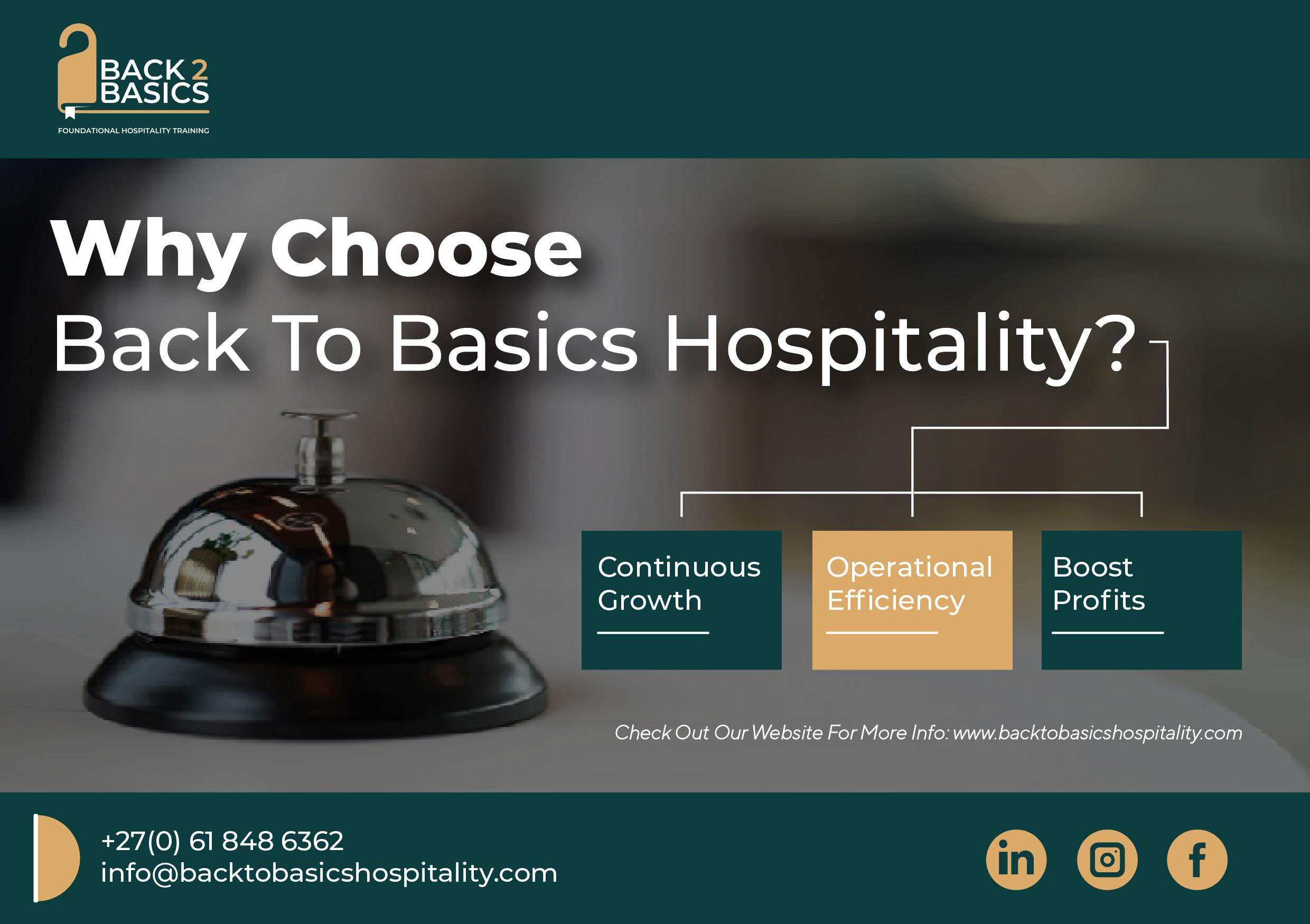AFRICA’S MICE LANDSCAPE & INFRASTRUCTURE GROWTH
G20: WHAT’S BEEN DONE AND WHAT’S TO COME

THE DRIVING FORCES BEHIND AFRICA’S HOSPITALITY RISE
AFRICAN HOSPITALITY DEVELOPMENT

AFRICA’S MICE LANDSCAPE & INFRASTRUCTURE GROWTH
G20: WHAT’S BEEN DONE AND WHAT’S TO COME

THE DRIVING FORCES BEHIND AFRICA’S HOSPITALITY RISE
AFRICAN HOSPITALITY DEVELOPMENT

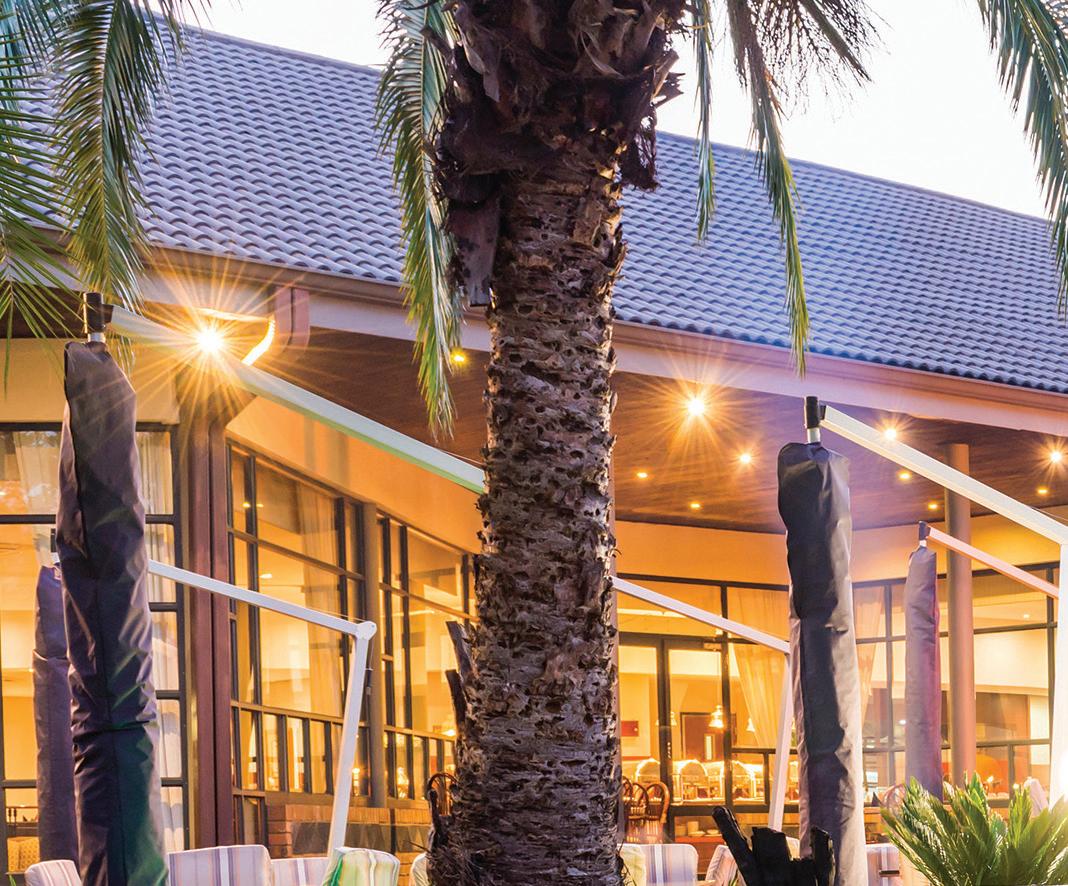
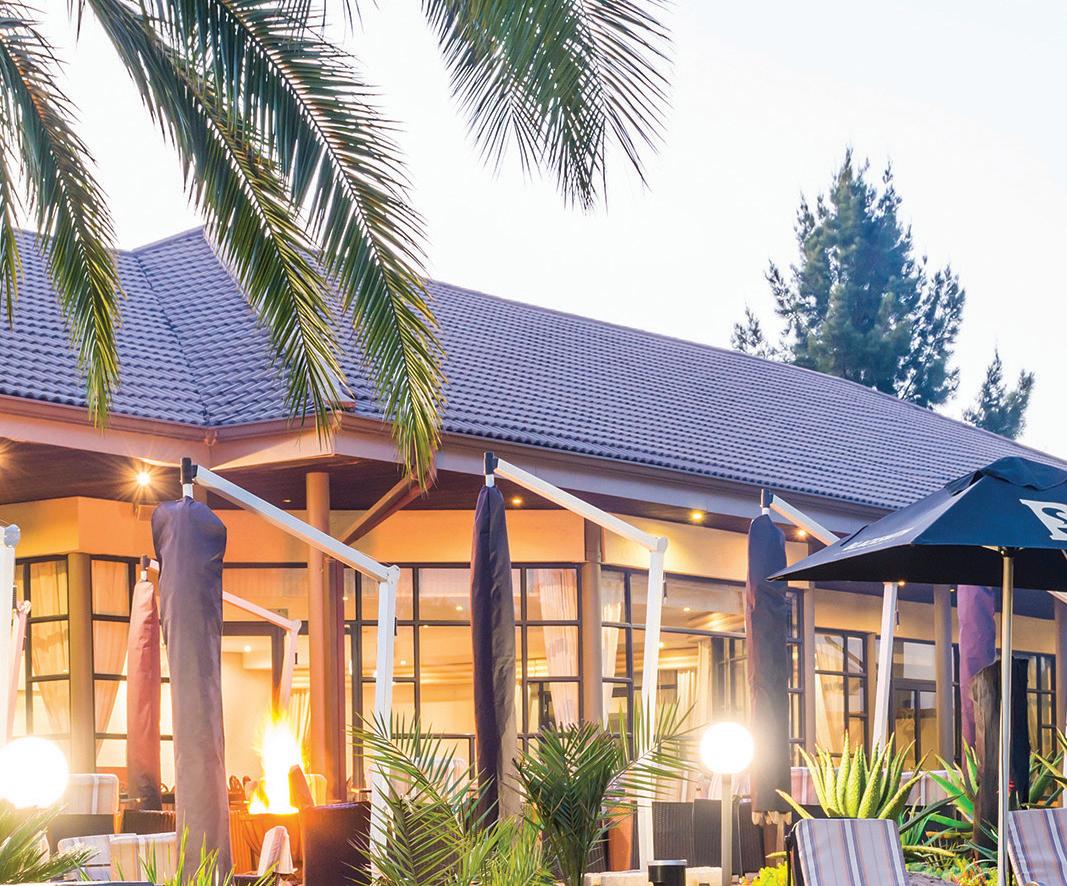



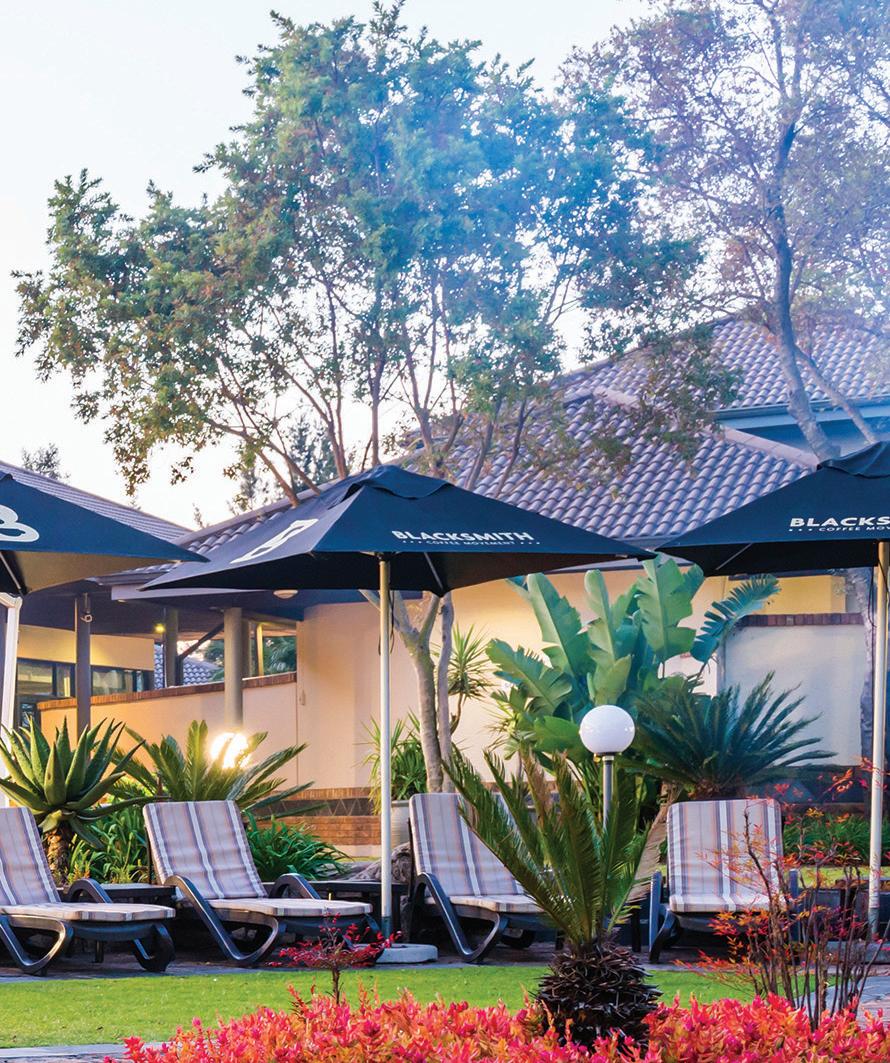



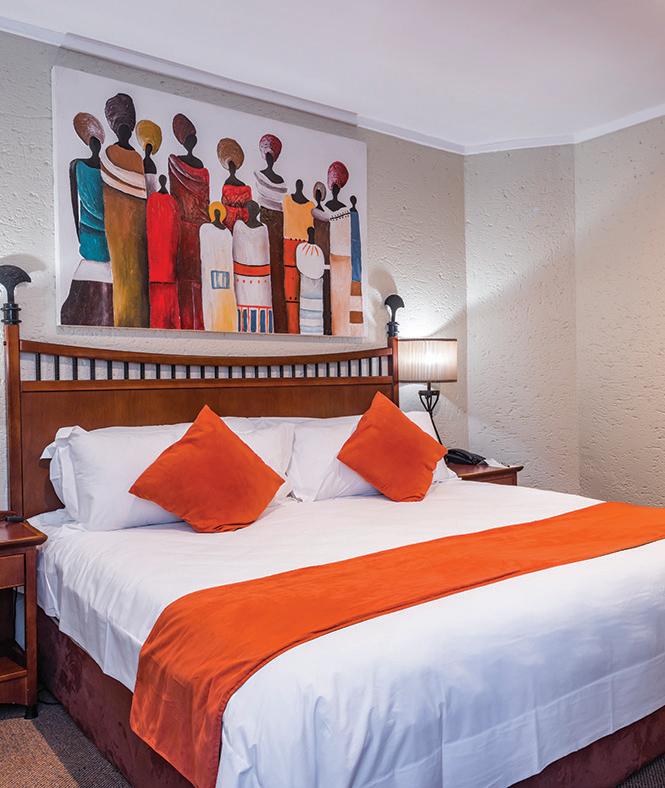
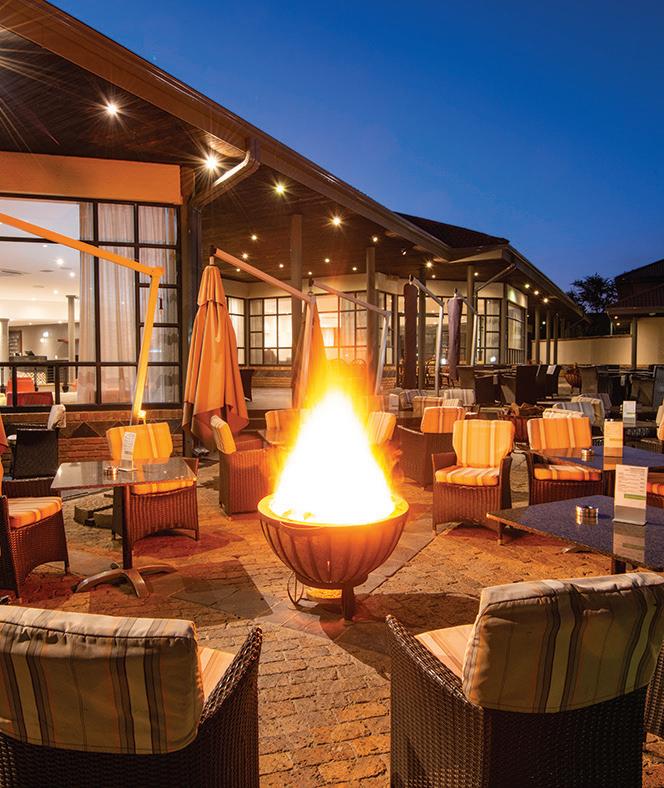



Set on a peaceful Benoni country estate, just outside the city buzz, aha Kopanong Hotel & Conference Centre o ers the best of both worlds, countryside calm with easy access to Gauteng’s attractions.
Dine at the Moshate Restaurant, where talented chefs create a home-away-fromhome experience overlooking the pool and terrace.
Renowned as one of Gauteng’s leading conference and event venues, Kopanong blends African charm, modern comfort, and seamless service - turning every stay and every gathering into something unforgettable.
At aha Kopanong, you’ll find more than just a hotel. You’ll discover a destination where the city slows down, nature comes alive, and every detail is crafted for connection, celebration, and escape.
8 10 12 14 16 6

Africa’s MICE Landscape & Infrastructure Growth
G20: What’s been done and what’s to come Africa on the Rise: Why Cities like Cape Town and Nairobi are Global Event Hubs
The Driving Forces Behind Africa’s Hospitality Rise Q & A with Werner Geere Introducing the TNA Wine Club

Dear Readers,
Welcome to this month’s edition of Tourism News Africa, where we celebrate the vibrant surge of African hospitality. The continent is no longer a footnote in global tourism but a dynamic force reshaping how the world travels, connects, and experiences culture. Our carefully curated stories this month spotlight the innovation, resilience, and cultural richness driving this transformation.
In A Deep Dive into South African Winemaking with Eben Sadie and Discover the TNA Wine Club, we uncork the artistry of Africa’s wine industry, led by visionaries like Eben Sadie and sommelier Lloyd Jusa. These pieces reveal how heritage, sustainability, and innovation converge to craft not just exceptional wines but unforgettable stories that resonate globally. From Swartland’s ancient soils to cutting-edge RFID technology ensuring authenticity, Africa’s vinous legacy is raising glasses worldwide.
The Driving Forces Behind Africa’s Hospitality Rise explores the engines powering this growth—improved air connectivity, robust investment, and shifting global perceptions. With over 577 hotels and 104,000 rooms in development, Africa is a frontier of opportunity, blending modern infrastructure with cultural authenticity. Meanwhile, Africa on the Rise: Why Cities like Cape Town and Nairobi are Global Event Hubs showcases how these cities are redefining global events with world-class venues and immersive experiences, from Table Mountain’s majesty to Nairobi’s wildlife wonders.
Our feature on Africa’s MICE Landscape: Surging Growth and Infrastructure Boom highlights the continent’s ascent as a Meetings, Incentives, Conferences, and Exhibitions powerhouse. With Cape Town, Kigali, and emerging destinations like Botswana’s Okavango Delta leading the charge, Africa is weaving cultural depth into business travel, creating economic ripples that uplift communities. Best of Culture and Business Showcasing Heritage further underscores how heritage-led hospitality—think KwaZulu-Natal’s literary trails or Namibia’s dark sky reserves—is turning tourism into a force for inclusive growth.
Finally, G20: What’s Been Done – and What’s Still to Come captures South Africa’s bold moment on the global stage as it hosts the 2025 G20 Summit. Beyond logistics, this event signals Africa’s growing influence, with initiatives like the global taskforce on wealth inequality and sustainable finance frameworks setting the tone for a more equitable future.
Africa’s hospitality boom is a story of ambition and authenticity. From urban hubs to remote reserves, the continent is crafting experiences that are as sustainable as they are unforgettable. As we look to the future, we invite you to join us in exploring, celebrating, and investing in Africa’s rise.
Warm regards,
Derek Martin Editor

“Africa’s Meetings, Incentives, Conferences, and Exhibitions (MICE) sector is emerging as a potential powerhouse of economic transformation.”
In the heart of a continent brimming with untapped potential, Africa’s Meetings, Incentives, Conferences, and Exhibitions (MICE) sector is emerging as a potential powerhouse of economic transformation.
As global business events rebound post-covid, Africa is not just participating - it’s leading with bold investments and innovative strategies. Africa is seeing the continent’s MICE industry witness soaring activity levels, driven by a surge in demand for world-class infrastructure and services. With the global MICE market projected to reach $1,466.94 billion by 2030 at a compound annual growth rate (CAGR) of 9.2%, Africa’s slice, and demand for a share of this pie is expanding rapidly. This is fuelled by our continents unique blend of natural beauty, cultural depth, and of course strategic positioning.
The Vibrant Tapestry of Africa’s MICE Destinations
Africa’s MICE landscape is as diverse as its geography, offering delegates experiences that transcend traditional boardrooms. From the bustling urban hubs of South Africa to the serene savannas of East Africa, our continent captivates with settings that inspire innovation and connection. The Mother City, Cape Town, has consistently been voted Africa’s Best MICE Destination in recent years, stands out with its iconic Table Mountain backdrop and stateof-the-art facilities like the Cape Town International Convention Centre (CTICC). This city hosted the SA Tourism Investment Summit last month (September 2025), underscoring its role in global events ahead of South Africa’s G20 presidency.

Further north, Rwanda’s Kigali has solidified its status as a MICE frontrunner with the Kigali Convention Centre, a modern marvel that combines cutting-edge technology with sustainable design. Kigali’s seamless event planning ecosystem, supported by efficient logistics and eco-friendly practices, makes it ideal for conferences focused on Africa’s development agendas. Kenya, through initiatives like “Meet in Kenya,” leverages Nairobi’s vibrant scene and natural attractions such as the Maasai Mara for incentive trips that blend business with adventure. Morocco’s Marrakech and Casablanca offer a fusion of historic charm and contemporary venues, while Zimbabwe’s Victoria Falls provides breathtaking backdrops for exhibitions and team-building retreats.
Emerging destinations are also making waves. Botswana’s Okavango Delta entices with luxury safari incentives, and West African nations like Ghana and Senegal are seeing increased activity thanks to economic booms. Hidden gems such as Namibia, Mozambique, Zambia, and Tanzania are also poised for breakthroughs, offering pristine landscapes for immersive events. These spots highlight Africa’s shift toward decentralizing MICE from major cities to regional hubs, fostering inclusive growth.
What sets Africa apart is its ability to infuse events with cultural authenticity. Delegates might engage in West African drumming workshops, explore ancient Egyptian sites during breaks in Cairo, or participate in community volunteering in South Africa’s townships. This cultural immersion not only enriches experiences but also promotes cross-border understanding, turning MICE into a catalyst for social impact.
“With the global MICE market projected to reach $1,466.94 billion by 2030 at a CAGR of 9.2%, Africa’s slice, and demand for a share of this pie is expanding rapidly.”

The meteoric rise of Africa’s MICE sector is underpinned by aggressive infrastructure developments, transforming the continent into a competitive global player. Governments and private investors are pouring resources into upgrading facilities to meet international standards. In South Africa, expansions at the Sandton Convention Centre in Johannesburg and the CTICC have enhanced capacity for large-scale events, supporting the country’s bid to capture a larger share of the global market.
Across the continent, key projects include Zimbabwe’s expansion of Victoria Falls International Airport, which improves accessibility for international delegates. Rwanda’s Kigali Convention Centre exemplifies sustainable infrastructure, featuring solar power and rainwater harvesting. Digital upgrades are equally crucial: rapid expansion of data centres and mobile networks is enabling hybrid events and real-time data analytics. Initiatives like South Africa’s “Meet IQ” portal provide live data on event impacts, aiding strategic planning.
West Africa is catching up with improved transport networks in Ghana and Senegal, while North Africa’s Morocco invests in high-speed rail links to connect MICE venues. These developments address historical gaps, such as limited airport capacity and road infrastructure, making Africa more accessible. For instance, new conference venues in smaller cities are emerging, driven by better travel links and investor confidence. Overall, these efforts are not just about building structures - they’re about creating ecosystems that support end-to-end event management, from visas to virtual integrations.
Several factors propel this growth. Government support is pivotal: policies like tax incentives, visa facilitations, and marketing campaigns. Economic multipliers are evident; South Africa’s MICE industry alone generates jobs in hospitality, transport, and supply chains, with events like the Mining Indaba boosting local economies.
Sustainability is now a standard, with events incorporating legacy projects that benefit host communities long-term. Technology integration, including AR/VR for hybrid formats, addresses Africa’s unique needs like remote accessibility. Collaboration is key, as seen in regional forums like the Africa CEO Forum and Africa Travel Indaba, which foster partnerships. Data-driven approaches, professional accreditation, and sector cross-pollination (e.g., with mining or tech) are also trending.
Despite the momentum, challenges persist. Uneven growth means some regions lag in infrastructure, requiring strategic reforms and investments. The fast pace strains professionals, highlighting needs for work-life balance and standardised training. Global competition demands Africa enhance convention centres and transport to rival Europe or Asia. Yet, these hurdles present opportunities: embracing hybrid models can bridge gaps, and focusing on intraAfrican events can build resilience.
As 2025 unfolds, Africa’s MICE sector is at a tipping point. South Africa’s G20 hosting is a game-changer, spotlighting the continent and creating supplier opportunities. Events like the Africa MICE Summit 2025 will unite leaders to shape policies. With continued infrastructure pushes and tech adoption, Africa could capture a trillion-dollar market share. The future? A connected, inclusive industry driving prosperity across borders.
“Overall, these efforts are not just about building structures – they’re about creating ecosystems that support endto-end event management, from visas to virtual integrations.”

Midgley
been done And what’s to come

South Africa is hosting the G20 for the first time in 2025 and with that comes a rare opportunity to reshape global conversations. Under the theme “solidarity, equality and sustainability”, the country has already made its mark with a series of bold moves, from high-level task teams to grassroots development efforts.
Since taking over the G20 presidency in December 2024, South Africa has hit the ground running. Preparations in Johannesburg which is the host city for the Leaders’ Summit in November are well underway. Venues like the Nasrec Expo Centre are being upgraded, the city’s safety infrastructure is getting a boost, and eco-friendly projects are being rolled out in key areas like Sandton and the inner city.
But the work goes beyond logistics.
One of the standout developments so far has been the creation of a global taskforce on wealth inequality, led by none other than Nobel laureate Joseph Stiglitz. The group is investigating how global wealth is distributed or more accurately, how it isn’t. Their findings are expected to spark important (and likely uncomfortable) conversations at the summit.
South Africa has also hosted several G20 working group meetings around the country, focusing on issues like health, trade, education, culture and climate change. These haven’t just been high-level talks. Many have included virtual participation and public engagement, reflecting the country’s emphasis on accessibility and inclusion.
At the same time, the Sustainable Finance Working Group has been developing a framework to direct more funding towards green, equitable development. And in a move that’s close to home for many African nations, South Africa has placed illicit financial flows firmly on the agenda, calling for greater transparency and accountability from both governments and multinational corporations.
In the digital space, the focus has been on building infrastructure that can support everything from e-government services to AI research. With the help of international partners, South Africa is championing a vision for technology that’s built in Africa, for Africa.
When the world’s leaders meet in Johannesburg this November, it won’t just be about handshakes and photo ops. The goal is to get real commitments on global inequality, on sustainable finance, and on how emerging technologies are governed.
It’s also expected to give South Africa’s tourism industry a serious boost. With an estimated of R1.2 billion+ in revenue expected, the G20 summit could leave a lasting legacy, not only in infrastructure, but in how the country is seen on the world stage.
As South Africa prepares to hand over the presidency to the United States, the message is clear: it’s time for the world to listen to voices that have been ignored for too long.

Jonty Bruggen News Correspondent


Africa is no longer just the backdrop for adventure tourism or wildlife safaris. Its cities are emerging as dynamic centres for global events, where business, culture, and innovation converge.
Among them, Cape Town and Nairobi are leading the charge, transforming into destinations where conferences, exhibitions, and international summits don’t just happen, they thrive.
Imagine walking into a conference hall perched against Table Mountain or stepping out of a meeting only to find yourself on a safari in Nairobi’s savannah. These cities aren’t just hosting events, they’re offering experiences that stay with attendees long after the last handshake.
When it comes to hosting world-class events, infrastructure is everything. Cape Town’s International Convention Centre (CTICC) and Nairobi’s Kenyatta International Convention Centre (KICC) offer cuttingedge facilities capable of hosting thousands of attendees. From sprawling exhibition halls to intimate boardrooms, these venues are built to accommodate events of any scale.
Accessibility is just as important. Both cities are wellconnected internationally, with direct flights from major hubs in Europe, Asia, and the Americas. Once you land, seamless transport options—modern taxis, urban transit, and airport shuttles—ensure delegates reach their destination without stress. For event organisers, this reliability is invaluable; for attendees, it’s a smooth introduction to the city’s charm.
Event success depends not only on the venue but also on the experience outside the conference hall. Cape Town’s luxury hotels along the V&A Waterfront, and Nairobi’s elegant city-centred resorts, provide more than just accommodation, they blend business efficiency with indulgence.
Think rooftop bars for networking sessions, boutique hotels for intimate workshops, and gourmet dining experiences that double as cultural immersion. The hospitality ecosystem is robust, diverse, and committed to world-class service, giving delegates comfort, convenience, and a taste of local flavour all in one stay.
Boutique hotels and serviced apartments add flexibility, catering to a variety of budgets without compromising on quality. This diversity ensures that every visitor, from corporate executives to creative professionals, finds a place that feels right at home.
Here’s where Cape Town and Nairobi truly set themselves apart. Beyond meetings and keynote speeches, these cities offer experiences that turn business trips into adventures.
In Cape Town, delegates can take a cable car up Table Mountain, sip wine in the Cape Winelands, or explore the historic V&A Waterfront after a long day of networking. Nairobi, on the other hand, pairs city sophistication with wildlife wonder. Delegates can enjoy safari drives in nearby reserves or explore cultural villages that celebrate Kenya’s rich heritage, all within a day’s journey from downtown meetings.
Imagine walking into a conference hall perched against Table Mountain or stepping out of a meeting only to find yourself on a safari in Nairobi’s savannah.
This combination of business and leisure doesn’t just enhance the event—it creates memories, encourages return visits, and fosters meaningful connections. Attendees leave feeling not just productive but inspired.
Modern events demand more than space, they require technology and innovation. Both cities have embraced this, offering hybrid conference capabilities, smart AV systems, and expert event management services. From livestreaming sessions to coordinating complex multi-day summits, Cape Town and Nairobi meet global standards with finesse.
This professionalism hasn’t gone unnoticed. International organisations increasingly choose these cities as reliable partners for high-profile events, ranging from corporate summits to cultural festivals. In Africa, it’s no longer about making do—it’s about delivering excellence on par with any global hub.
Hosting international events does more than boost visibility, it has a tangible economic impact. Conferences and exhibitions attract business travellers who spend on accommodation, dining, transportation, and local attractions, injecting significant revenue into the local economy.
Moreover, the rise of these hubs are creating jobs in hospitality, transport, and tourism, while encouraging investments in infrastructure and training. Every successful event contributes to a cycle of growth, strengthening the city’s position as a premier destination and improving the overall experience for future delegates.
“Every successful event contributes to a cycle of growth, strengthening the city’s position as a premier destination and improving the overall experience for future delegates.”
What truly strengthens Cape Town and Nairobi’s position as global event hubs is their role as platforms for collaboration and knowledge exchange. International conferences held in these cities bring together leaders, innovators, and thinkers from across the globe, creating opportunities for partnerships that extend far beyond the event itself. Whether it’s in business, academia, or culture, hosting events in Africa encourages dialogue that sparks innovation, investment, and lasting global connections.
Africa’s story is one of ambition, innovation, and resilience. Cape Town and Nairobi are proof that the continent is capable of hosting world-class events while showcasing its unique culture and natural beauty. As investment in infrastructure, technology, and service standards continues, these cities are poised to solidify their positions on the global stage.
For event organisers, the message is clear: Africa is ready, capable, and eager to deliver unforgettable experiences. And for attendees, it’s an invitation to engage, explore, and be inspired, long after the conference lights go down.


Lizelle Smith News Correspondent
In the vibrant world of African tourism and hospitality, the TNA Wine Club emerges as a captivating YouTube podcast and video series presented by the esteemed Lloyd Jusa, Wine Director and Head Sommelier at Johannesburg’s luxurious Saxon Hotel.
Lloyd is best known for his wealth of knowledge and regarded as one of SA’s leading sommeliers, and this series promises to uncork the essence of wine appreciation, blending education, trends, and insider insights for enthusiasts and professionals alike.
The TNA Wine Club delves into all things wine with a fresh, engaging approach. Viewers can expect practical guidance on selecting the right glassware to enhance flavours, food pairings that enable the wine to take centre stage, exploring harmonious matches like robust South African Cabernet Sauvignon with grilled lamb or crisp Chenin Blanc alongside fresh seafood, drawing from Africa’s diverse culinary landscapes.
The series keeps pace with what’s popular and on trend, highlighting rising stars such as natural wines, sustainable viticulture in the Cape Winelands, and the growing popularity of African indigenous grape varieties. From eco-friendly practices to innovative blends influenced by climate change, TNA Wine Club spotlights the evolving wine scene across the continent.

At its core are hard-hitting interviews with industry titans. The inaugural episode features Eben Sadie of Sadie Family Wines, where he shares his global journey, winemaking philosophy, and challenges like trade barriers affecting South African exports. Discussions deepen into heritage, artistry, and technological solutions like RFID for wine authenticity. Future episodes promise more unfiltered conversations with top winemakers, sommeliers, and exporters, revealing the stories behind the bottles.
Whether you’re a novice sipper or seasoned connoisseur, TNA Wine Club offers an accessible gateway to wine’s wonders. Subscribe to Tourism News Africa on YouTube for episodes that educate, inspire, and tantalise the palate.
“The
into
all
TNA Wine Club delves
things wine with a fresh, engaging approach. Viewers can expect practical guidance on selecting the right glassware to enhance flavours”

The TNA Wine Club, kicked off with a compelling twopart interview featuring Eben Sadie, the visionary behind Sadie Family Wines. Filmed in the Saxon’s luxurious wine cellar, these episodes offer an unfiltered look into Sadie’s global journey, winemaking philosophy, and the challenges shaping South Africa’s wine industry.
In the inaugural episode, Eben Sadie shares his remarkable path from a young winemaker to a global icon in the wine world. He recounts his international experiences, from working harvests in Bordeaux to exploring vineyards in Spain’s Priorat, both of which shaped his approach to crafting wines that express South Africa’s unique environmental factors - all of which impact the grape crop: unique environmental contexts, farming practices, and ,of course, a crop’s specific growth habitat. Sadie’s philosophy centre’s on authenticity, emphasising minimal intervention to let the Swartland region’s ancient soils and vines tell their story. He discusses challenges like trade barriers, including high tariffs and logistical hurdles, which hinder South African wine exports in markets like the EU and Asia. These barriers, he notes, demand resilience and innovation from producers to maintain global competitiveness.
Part 2 of the interview delves deeper into Sadie’s commitment to heritage and artistry. Sadie explores how South Africa’s diverse cultural and agricultural history informs his winemaking, blending tradition with modern techniques. A highlight in this podcast is a discussion around technological advancements, such as RFID tags to ensure wine authenticity and combat
counterfeiting, a growing concern in the premium wine market. However, Sadie brings balance to the argument questioning whether the resale of wine is actually hurting the global wine industry as the primary reason wine is made is to be drunk and enjoyed.
Sadie also reflects on the artistry of winemaking, likening it to storytelling, where each vintage captures a moment in time. Looking ahead, The TNA Wine Club promises more candid interviews with top winemakers, sommeliers, and exporters, continuing to uncover the stories behind Africa’s finest bottles.
Subscribe to Tourism News Africa on YouTube to explore Sadie’s full conversation and future episodes that celebrate the continent’s vinous legacy.

Chris Midgley News Correspondent
“Africa’s hospitality rise is not a coincidence. It is the
product of deliberate investments, improved infrastructure, shifting perceptions, and a bold embrace of sustainability and cultural storytelling.”
Africa is no longer on the sidelines of global hospitality growth. Once overlooked by investors and often misunderstood by travellers, the continent is experiencing a surge of international hotel developments, rising visitor numbers, and stronger regional cooperation. But what is truly powering this rise? Is it investment, improved infrastructure, or a changing global perception of the continent? This article explores the key factors behind Africa’s hospitality boom and what they mean for the continent’s future.
Improved air routes and infrastructure are among the strongest enablers of Africa’s hospitality expansion. Airlines such as Ethiopian Airlines, RwandAir, and Kenya Airways have expanded their regional and international networks, allowing smoother travel across African countries and linking them to global hubs. For example, Ethiopian Airlines now connects Addis Ababa to more than 60 African cities, making it one of the most connected aviation hubs on the continent. Not only does this boost domestic and regional tourism, it has also transformed the way international travellers can now experience Africa.
Visitors are no longer confined to one country due to logistical barriers; instead, they now combine various countries all within a single journey.
Another important driver of Africa’s hospitality rise is the wave of investment and hotel development sweeping across the continent. According to the W Hospitality Group Pipeline Report, Africa now boasts over 577 hotels and 104,000 rooms in development, a 13% year-on-year increase that outpaces global averages. Why this surge?
International hotel giants such as Hilton, Marriott, Radisson, and Accor see Africa as one of the world’s last untapped growth frontiers. With a young population, rising middle class, and increasing disposable incomes, the continent offers both international and domestic demand. North Africa, particularly Egypt and Morocco, leads the way with a 23% growth rate compared to just 6% in Sub-Saharan Africa.
With the arrival of international hotel brands has come the adoption of advanced digital platforms that make travel more seamless. Guests can now book, check in, and review African hotels as easily as they can in Europe or Asia. Chains like Radisson Blu in Nairobi and Marriott in Cape Town use mobile apps for reservations, service requests, and loyalty programmes, while online reviews on platforms such as TripAdvisor build trust among firsttime visitors. This digitalisation is critical as it reduces the uncertainty of booking in unfamiliar destinations, while empowering local hotels to compete globally. For international travellers, it means Africa now offers not only unique experiences but also the same level of digital convenience they expect elsewhere.

“Africa is
Once
no
longer
on the sidelines of global hospitality growth.
overlooked by investors and often misunderstood by travellers,
the
continent is experiencing a surge of international hotel developments, rising visitor numbers, and stronger regional cooperation.”
For decades, Africa’s biggest challenge was not its lack of attractions, but the perceptions shaped by international media. Narratives often focused on instability and risk, overshadowing the continent’s vibrant cultures and safe, thriving cities. This perception is changing. Governments are actively marketing their countries as tourist destinations ready to welcome the world. Examples include Mauritius’ #MauritiusNow campaign with the goal of establishing Mauritius as a leading destination for genuine and memorable experiences and Kenya’s “Magical Kenya” campaign showcasing the country’s wildlife, culture, and heritage. As a result of campaigns of this nature, travellers who previously considered other regions are increasingly viewing Africa as a prime destination.
Regional policies have also smoothed the path for hospitality growth. Initiatives like the African Continental Free Trade Area (AfCFTA) and regional blocs such as SADC have lowered barriers to movement, trade, and investment. For example, Botswana and Namibia now allow cross-border travel using only ID cards, while Kenya recently opened its borders visafree to all African nationals. These measures have a double effect: they encourage intra-African tourism, making it easier for citizens to explore neighbouring countries, while also attracting international visitors who can move more freely across the continent once they arrive. This results to multi-country itineraries, and greater demand for hotels across regions.
Sustainability is no longer just about protecting the environment; it has become a marketing tool and a competitive advantage. According to Booking.com’s 2025 Travel & Sustainability Report, 84% of global travellers consider sustainable choices important, and African countries are responding. Rwanda was one of the first countries in the world to ban singleuse plastics in 2008, branding it as the “cleanest country in Africa”. In Mozambique, the world’s largest mangrove restoration project is underway, while in South Africa, conservation initiatives such as those led by the Endangered Wildlife Trust focus on protecting endangered species, restoring critical habitats, and working with local communities to ensure biodiversity thrives. These strides reassure conscious travellers that their spending supports both communities and conservation, further positioning Africa as a leader in eco-conscious travel.
Finally, Africa’s greatest strength lies in its cultural diversity and rich lived experiences. Unlike other regions, the continent is a true melting pot where history, heritage, and modern life converge. In Mauritius, Hindu, Muslim, and Christian traditions shape festivals and cuisine, while across Southern Africa, a wide range of communities contribute to vibrant cultural landscapes. In some places, this diversity is also reflected in the built environment: for example, Namibia’s Swakopmund combines German colonial architecture with local heritage, showcasing how history and culture intertwine. This fusion not only enriches the visitor experience but also sets Africa apart from Asia or Europe. Tourists are not just coming for the wildlife or beaches; they are coming to understand how history, migration, and culture have shaped a continent.
Africa’s hospitality rise is not a coincidence. It is the product of deliberate investments, improved infrastructure, shifting perceptions, and a bold embrace of sustainability and cultural storytelling. While challenges remain, the continent is now firmly on the global map — not just as a niche adventure destination, but as a mainstream hub for leisure, business, and cultural exploration. With international hotel brands expanding, and travellers increasingly seeking authentic experiences, Africa’s hospitality future looks brighter than ever.


Roux-Ché Shidute
News Correspondent

What key trends are driving Africa’s emergence as a dynamic and influential tourism region?
There’s something exciting happening across Africa’s tourism landscape, and it’s not just about safaris or sandy beaches anymore. From upgraded airports to easier visa access, the continent is opening up like never before. Whether you’re flying into Nairobi, Addis Ababa, or Cape Town, getting around is smoother, faster, and more connected.
But the real shift goes deeper. Governments are rethinking their economic playbooks, moving away from heavy reliance on oil and gas and leaning into something far more sustainable and meaningful: Tourism! Why? Because tourism doesn’t just boost GDP, it tells a story. It showcases the beauty, culture, and spirit of a country in ways that leave a lasting impression. And increasingly, that story is being told through a bold new lens: Afrofuturism.
I was recently invited to attend a lecture at the School of Tourism & Hospitality Johannesburg, where two bright minds of our industry shared bravely and inspiringly that Afrofuturism is more than a buzzword, it’s a movement. It blends Africa’s rich heritage with a forward-looking vision, inspiring everything from museum design to music festivals. Countries like Ghana, Rwanda, and South Africa are using it to reframe how the world sees them, not just as destinations, but as cultural powerhouses. Guest experiences therefore have never been more magical.
And the timing couldn’t be better. Global demand for leisure experiences is spreading like wildfire. Travellers aren’t just looking for places to go, they’re looking for places to feel something. Africa, with its depth, diversity, and imagination, is stepping up to meet that demand in a way that’s fresh, authentic, and unforgettable.
How are African destinations distinguishing themselves from other global markets?
If you’ve been watching Africa’s tourism scene lately, you’ll know it’s not just evolving, it’s rewriting the rules. At this year’s WTM Africa seminar, “From Safaris to Summits,” I had the privilege of hearing from some of the continent’s most respected voices in travel and hospitality. What stood out wasn’t just the ideas, it was the unity. Industry leaders spoke passionately about how Africa’s destinations are no longer promoting in isolation. We’re showing up as a collective, advocating for each other, and telling a shared story that’s bigger than any one country.
And that’s exactly how African destinations are setting themselves apart. While other global markets compete on convenience or luxury, Africa is leaning into its soul. From the rhythm of a village market to the silence of a desert sunrise, we offer contrast, depth, and connection. It’s not just about where you go, it’s about what stays with you.
How is Africa attracting new traveller segments, such as “bleisure” tourists or eco-conscious visitors?
Across the continent, cities like Cape Town, Kigali, Nairobi, and Accra are positioning themselves as dual-purpose destinations. They’re offering world-class conference venues, reliable connectivity, and vibrant cultural scenes, all within reach of nature escapes, wine routes, and heritage tours. It’s the kind of setup that lets business travellers extend their stay and switch seamlessly into leisure mode. And with remote work now part of the global norm, more professionals are choosing African destinations where they can log in from a lodge and log out on a beach.
Then there’s the green-minded traveller. They’re not just here for the views, they’re here to make a difference. Whether it’s staying at carbon-neutral lodges in Namibia, joining marine conservation efforts in Mozambique, or supporting community-run wildlife reserves in Kenya, Africa is offering experiences that feel good and do good. What’s exciting is that these aren’t just passing trends. They’re reshaping how Africa tells its tourism story, one that’s more intentional, more inclusive, and more connected to the land and its people.
How can governments and private enterprises collaborate most effectively to unlock Africa’s tourism potential?
Let’s be honest, unlocking Africa’s full tourism potential isn’t a solo mission. It takes teamwork. And across the continent, we’re seeing some great examples of governments and private players rolling up their sleeves and building something meaningful together.
Just look at Wesgro in the Western Cape. They’re not just talking about tourism, they’re making it happen. Their Air Access initiative helped bring in new flight routes, making Cape Town more connected than ever. And by teaming up with hotel groups, trade platforms, and creative campaigns, they’re giving local businesses a real shot at global visibility.

Over in Rwanda, the Rwanda Development Board (RDB) is showing what smart collaboration looks like. The Volcanoes National Park Experiential Centre is a great example – it is a joint effort that blends conservation, education, and tourism into a world-class experience that draws visitors, it creates jobs, communities are supported, and Rwanda’s natural treasures enjoys great protection.
What makes these partnerships work is simple: shared goals and early collaboration. When governments and businesses sit down together from the start, aligning on branding, sustainability, and community impact, the results go far beyond bookings. They build legacy.
Reflecting on your career, what experience or project has most shaped your perspective on Africa’s tourism growth?
Looking back, one of the most defining chapters in my career came just after COVID, during my time as Marriott’s Director of Owner Relations for Africa. My role focused on nurturing relationships with hotel owners and partners across the continent - many of whom were navigating uncertainty, recalibrating their ambitions, and questioning what the future of tourism and their hotels might look like.
What struck me most during that time was the sheer volume of ideas and the deep desire to build beautiful, meaningful spaces across Africa and her islands. There was vision, there was passion, but there was also scepticism. Many in the ownership and hospitality community feared that progress would be slow, expensive, and isolating unless we found a new way to boost tourism, one rooted in collaboration and shared belief.
Fast-forward a few years, and the shift has been remarkable. The world’s pent-up demand for leisure and luxury, born out of confinement, has met Africa’s readiness to welcome it. Today, we’re seeing more hotels under development than ever before, in places that previously had no formal accommodation. These aren’t just buildings, they’re gateways to nature, culture, and cuisine, and they’re being led by owners and operators who are delivering world-first experiences that feel fresh and deeply African.
That period reminded me of a simple, yet powerful idea made famous by recovery communities and popular culture in the late 1900’s: “Doing the same thing over and over and expecting different results really is a kind of madness”. Africa’s tourism and hospitality sector is still green, but it’s growing. And if we keep leaning into new ideas, I believe we’ll continue to shape a Tourism future that’s not only prosperous, but profoundly memorable.
Looking ahead, what do you see as the biggest opportunities and challenges for Africa’s hospitality and tourism sector over the next decade?
Looking forward, one of the biggest opportunities for Africa’s hospitality and tourism sector lies in how we shape our own narrative. The world is watching, and we have the chance to define ourselves not just as a destination, but as a continent of innovation, creativity, and unforgettable experiences. That means investing in storytelling, in design, and in the kind of hospitality that feels distinctly African, not borrowed from elsewhere.
There’s also huge potential in tapping into our youth. Africa’s next generation is tech-savvy, entrepreneurial, and full of fresh ideas. If we empower them, through training, funding, and platforms, they’ll build the next wave of travel experiences that are future-ready.
But we’ll need to navigate some real challenges too. Climate resilience will be key. As weather patterns shift and environmental pressures grow, our sector must adapt, rethinking how we build, where we build, and how we protect the natural and cultural assets that make Africa so special.
And perhaps the biggest challenge of all: staying united. With so many countries, languages, and tourism boards, it’s easy to fall into fragmented efforts. But if we keep showing up for each other, we’ll unlock something far greater than individual success. We’ll build a continentwide legacy.

Werner Geere
Co-Founder + Owner Relations and Asset Management Director Executive Director
Nexture Hospitality Group

Africa is rising, and nowhere is this more vivid than at the intersection of culture, heritage and hospitality. Across the continent, a renaissance of heritage led hospitality is turning travel into both a deeply enriching cultural experience and a driver of sustainable business growth.
In KwaZulu-Natal, a long-running literary tourism initiative has reframed local writing as a travel asset.
Purpose built “writer trails” connect place to text and crucially, they are conducted by trained community guides turning local knowledge into income while immersing visitors in living cultural landscapes. The project’s work spans public archives, maps and themed routes across the province, evidencing how storytelling can anchor destination appeal and community participation.
Namibia’s desert night is another powerful case study. The NamibRand Nature Reserve is recognised as an International Dark Sky Reserve, celebrated for exceptionally dark, protected skies.
Stargazing here isn’t just spectacle; it’s conservation aligned tourism that leverages a unique natural asset while reinforcing a stewardship ethic around light and land use. Experiences built around these skies demonstrate how environmental protection and tourism value can reinforce one another.
As heritage centred offerings grow, an important question follows: who benefits? Recent research highlights that some models of luxury tourism across Africa tend to isolate visitors from surrounding communities, import supply chains and export profits which is dampening local multipliers and sometimes deepening inequality. The warning is clear: without careful design, premium positioning can undercut inclusive development.
A more resilient model is taking shape: communityanchored hospitality that builds cultural experiences into the core itinerary rather than the gift shop.
Think co-owned lodges that incorporate craft ateliers into the stay; culinary programs that foreground regional foodways while sourcing from nearby smallholders; and guided cultural routes that compensate local experts as lead interpreters, not just performers. These are not addons, they are the product. The result is a visitor economy where heritage is preserved because it is directly tied to livelihoods.
This heritage and business hybrid is more than a trend; it’s a competitive identity for African destinations. Boutique properties can differentiate through cultural depth rather than only through amenities. National parks and reserves can build value chains around conservation positive experiences like from night sky interpretation to community led storytelling. Urban hubs can stitch archives, markets, galleries and neighbourhoods into walkable cultural circuits that encourage longer stays and higher local spend.
By merging heritage with enterprise, Africa isn’t simply showcasing its past; it’s designing its hospitality future. Growth is no longer measured only by arrivals or room keys, but by how thoughtfully destinations preserve stories, circulate value locally and invite travellers into authentic, living cultures worth returning to…and investing in.

Jesse Morris News Correspondent
